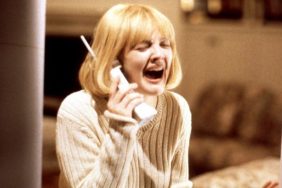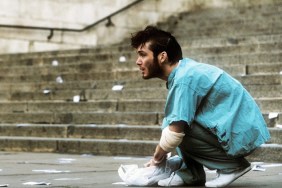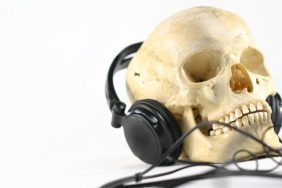SoundTreks is taking a slightly different tack this week. Rather than review a single soundtrack record, as is our usual wont, we’re going to compile a list. It’s October, and multiple horror movies must be covered. This week, that coverage shall be supplied.
As has been endlessly iterated by hundreds of breathless film critics, horror movies would be nothing without their music. Horror movies are, under the best of circumstances, all about evoking fear and disquiet, and merely watching a poor doomed soul wander through a dark room cannot instill fear and disquiet as well as it can with a well placed piano chord or shimmering violin glissando. Even for a relatively cheap horror movie moment – as when a cat leaps from the darkness, employing the cheapest type of jumpscare in cinema – it will always make one jump if it is accompanied by a nice, loud booming drum beat and a bass-heavy cello pound.
Check Out: The 10 Greatest Horror Movie Rap Songs
Looking back over some of the best horror movies, one finds that they might be considered the best due to their musical scores. A good, spooky, evocative score does more to elevate a horror movie than any of its visual elements. In the best of cases, you can even remember the score, hum along to it, and get a similar fearful chill when hearing the music even out of context. A note to horror filmmakers: if you want your horror movie to stand out, don’t cheap out on the music. Lighting, fine. Visual effects, sure. But never the sound or the music. It’s what separates the men from the boys.
As such, SoundTreks is going to run down the 10 best – in our humble opinion – horror movie themes of ever produced. Turn off the lights and listen.
10. Puppet Master – Richard Band
The first Puppet Master film from 1989 is a pretty effective cheapie put out by Charles Band’s prolific and impressive Full Moon Pictures. Puppet Master is well-known to genre fans and aging video store rats, and its many sequels may have been consumed by youngsters today, but none of the films in the 11-film series can be considered a classic by any stretch (although Puppet Master II is pretty great).
The theme song, however, sticks in the memory as insidiously as the Jeopardy! theme. It’s a lilting, synth-performed waltz that is just simple enough to be an earworm, but just spooky enough to evoke a haunted house mood.
9. Candyman – Philip Glass
Candyman is a horror classic from the 1990s that too often remains unmentioned in conversations about horror greats. The film is about an urban legend – a vengeful ghost with a hook for a hand – that comes terrifyingly to life in an impoverished downscale housing project. Candyman is a tragic figure, however, and Philip Glass’ score doesn’t focus so much on the fear or the mayhem of the story, but its sadness. His gentle, repetitive piano riff is winsome and distant. Death is not hard, but lachrymose.
8. A Nightmare on Elm Street – Charles Bernstein
Although Freddy Krueger eventually became a quipster and an appealing Joker-like supervillain in his multiple sequels, it must be remembered that he was, back in 1984, a filthy, death-loving child murderer. He lived in boiler rooms, wore a grimy sweater, and probably smelled horrible; I picture a combination of old garage and rotting meat. Freddy was unclean and unpleasant. Charles Bernstein’s score for the original Nightmare on Elm Street has a gentle lullaby in the foreground (a riff that haunted a generation), but it seems viscous underneath. The hissing and buzzing make me feel sweaty, and the score never forgets the shaky, dreamlike unreality of the world.
7. The Omen, “Ave Satani” – Jerry Goldsmith
Jerry Goldsmith’s theme for The Omen sounds like it has cobwebs on it, and for many years, I assumed that this was an old Baroque piece that was repurposed for the movie. For a film that deals with the Antichrist – an ancient figure of ancient Biblical texts – a cobweb-coated baroque piece is perfect. “Ave Satani” is an inversion of old church music, invoking the name of The Dark One in Latin, all while chimes play. Satan looms large in the Christian world, and this piece of music looms as large as the unholy.
6. Hellraiser – Christopher Young
Hellraiser is unique. It created an indelible mythology, and invented some of the most striking creatures ever committed to film. Seekers of the ultimate sexual experience can, via a magical puzzle box, summon a group of otherworldly sadomasochists who give you that ultimate in sensual pleasure: that of being bodily ripped to pieces. It’s a dirty movie, and very adult. Sex, fear, pain, pleasure. They are all a nightmarish waltz. Christopher Young’s opening score starts out as a gentle dance, and turns into a swirling phantasmagoria of pain. It’s great.
5. The Shining – Wendy Carlos, Rachel Elkind-Tourre
The Shining‘s score is definitely funereal. It’s all bass notes, soft heartbeats, and pounding percussion. It bides its time percolating softly in the background, unleashing with loud banging at choice moments. In terms of movie scores The Shining is unusual. It punctuates the action, but somehow removes each scene from one another, leaving a string of increasingly dreamlike ghost encounters. The Shining eventually loses its sense of time, compressing the past and the present into a single ghostly unconsciousness. The opening score is all foreboding, and no comfort. These people aren’t happy now, and nothing good will come to them.
4. The Exorcist – Mike Oldfield
The theme song for William Friedkin’s The Exorcist is not, as you would expect, church-like. While the classic deals directly with issues of faith, Catholicism, sacrifice, and real evil in the universe, the score does not overwhelmingly evoke the religious angle. The original theme song was a Mike Oldfield piece called “Tubular Bells,” which, in its original form, was more New Wave than horror, but when slightly reworked, it becomes terrifying and regretful. The Exorcist is an adult movie, and the score is oddly universal.
3. Halloween – John Carpenter
How odd that one of the scariest horror movie theme songs should also be one of the simplest. John Carpenter, plinking away at a synth in 1978, churned out the repetitive high notes of the Halloween theme, and history was made. This is a song that any young person, spitballing at a piano, could recreate, yet its simplicity and spareness adds a dark undercurrent to a movie that is terrifying and indelible. The film, made on a budget, gets a lot of mileage from its spare qualities, and its score, equally spare, somehow elevates the movie to something greater than the sum of its parts. It’s a gorgeous, scary, functional theme that evokes autumn winds and dark Halloween nights.
2. Suspiria – Goblin
This may be true of most horror films, but it’s especially true of Dario Argento’s 1977 classic Suspiria: If you were to delete the score, or even alter it a single whit, the film would collapse. Suspiria lives and dies by its score, composed by the Italian rock band Goblin. The film is gorgeous, colorful, and super-stylized, but Goblin’s orchestra-from-the-cheaper-sections-of-Hell dictates the mood. It’s a film about witches, and Goblin, not to be misinterpreted, added aggressive whispers to the score, openly declaring that there are witches present. It’s throbbing and unsettling. Suspiria would be notable without the theme music, but it wouldn’t be terrifying.
1. Psycho – Bernard Herrmann
The grandaddy of all horror scores, Bernard Herrmann’s all-string ensemble for Psycho has led the way since 1960. Psycho was a come-down for Hitchcock, following as he did a string of successful and gigantic Hollywood thrillers with a relatively cheap, and most certainly daring murder mystery. The score was ostensibly spare, but ended up being aurally complex and twisted. The high pitched squealing evokes an unstable mind better than any piece of music outside of depressive German death metal, and it remains perhaps the most iconic horror movie score of all time.
Photo Credit: 20th Century Fox
Witney Seibold is a contributor to the CraveOnline Film Channel, and co-host of The B-Movies Podcast. You can follow him on “Twitter” at @WitneySeibold, where he is slowly losing his mind.
The Longest Running Horror Movie Franchises
The Longest-Running Horror Franchises
-
Saw (Seven Films)

-
Saw (2004)
-
Saw II (2005)
-
Saw III (2006)
-
Saw IV (2007)
-
Saw V (2008)
-
Saw VI (2009)
-
Saw: The Final Chapter (2010)
Photo: Lionsgate
-
-
The Howling (Eight Films)

-
The Howling (1981)
-
Howling II: Your Sister is a Werewolf, a.k.a. Howling II: Stirba - Werewolf Bitch (1985)
-
The Marsupials: The Howling III (1987)
-
Howling IV: The Original Nightmare (1988)
-
Howling V: The Rebirth (1989)
-
Howling VI: The Freaks (1991)
-
Howling: New Moon Rising (1995)
-
The Howling Reborn (2011)
Photo: Anchor Bay
-
-
Hellraiser (Nine Films)

-
Hellraiser (1987)
-
Hellbound: Hellraiser II (1988)
-
Hellraiser III: Hell on Earth (1992)
-
Hellraiser: Bloodline (1996)
-
Hellraiser: Inferno (2000)
-
Hellraiser: Hellseeker (2002)
-
Hellraiser: Deader (2005)
-
Hellraiser: Hellworld (2005)
-
Hellraiser: Revelations (2011)
Photo: Dimension Extreme
-
-
Halloween (Ten Films)

-
Halloween (1978)
-
Halloween II (1981)
-
Halloween III: Season of the Witch (1982)
-
Halloween 4: The Return of Michael Myers (1988)
-
Halloween 5: The Revenge of Michael Myers (1989)
-
Halloween: The Curse of Michael Myers (1995)
-
Halloween H20: 20 Years Later (1998)
-
Halloween: Resurrection (2002)
-
Halloween (2007)
-
Halloween II (2009)
Photo: Dimension Films
-
-
Coffin Joe (Eleven Films)

-
At Midnight I'll Take Your Soul (1963)
-
This Night I'll Possess Your Corpse (1967)
-
The Strange World of Coffin Joe (1968)
-
Awakening of the Beast (1970)
-
The End of Man (1970)
-
The Bloody Exorcism of Coffin Joe (1974)
-
The Strange Hostel of Naked Pleasures (1976)
-
Hellish Flesh (1977)
-
Hallucinations of a Deranged Mind (1978)
-
Perversion (1979)
-
Embodiment of Evil (2008)
Photo: 20th Century Fox
-
-
Friday the 13th (Twelve Films)

-
Friday the 13th (1980)
-
Friday the 13th Part 2 (1981)
-
Friday the 13th Part III (1982)
-
Friday the 13th: The Final Chapter (1984)
-
Friday the 13th: A New Beginning (1985)
-
Friday the 13th Part VI: Jason Lives (1986)
-
Friday the 13th Part VII: The New Blood (1988)
-
Friday the 13th Part VIII: Jason Takes Manhattan (1989)
-
Jason Goes to Hell: The Final Friday (1993)
-
Jason X (2002)
-
Freddy vs. Jason (2003)
-
Friday the 13th (2009)
Photo: New Line Cinema
-
-
Witchcraft (Thirteen Films)

-
Witchcraft (1988)
-
Witchcraft II: The Temptress (1990)
-
Witchcraft III: The Kiss of Death (1991)
-
Witchcraft IV: The Virgin Heart (1992)
-
Witchcraft V: Dance with the Devil (1993)
-
Witchcraft VI: The Devil's Mistress (1994)
-
Witchcraft VII: Judgement Hour (1995)
-
Witchcraft VIII: Salem's Ghost (1996)
-
Witchcraft IX: Bitter Flesh (1997)
-
Witchcraft X: Mistress of the Craft (1998)
-
Witchcraft XI: Sisters in Blood (2000)
-
Witchcraft XII: In the Lair of the Serpent (2002)
-
Witchcraft XIII: Blood of the Chosen (2006)
Photo: Simitar Entertainment
-
-
1313 (Fourteen Films)

1. 1313: Wicked Stepbrother (2011)
2. 1313: Actor Slash Model (2011)
3. 1313: Boy Crazies (2011)
4. 1313: Haunted Frat (2011)
5. 1313: Nightmare Mansion (2011)
6. 1313: Giant Killer Bees (2011)
7. 1313: Cougar Cult (2012)
8. 1313: Bigfoot Island (2012)
9. 1313: UFO Invasion (2012)
10. 1313: Bermuda Triangle (2012)
11. 1313: Billy the Kid (2012)
12. 1313: Hercules Unbound! (2012)
13. 1313: Night of the Widow (2012)
14. 1313: Frankenqueen (2012)
Photo: Rapid Heart
-
Amityville (Fourteen Films)

1. The Amityville Horror (1979)
2. Amityville II: The Possession (1981)
3. Amityville 3-D (1983)
4. Amityville 4: The Evil Escapes (1989)
5. The Amityville Curse (1990)
6. Amityville 1992: It's About Time (1992)
7. Amityville: A New Generation (1993)
8. Amityville Dollhouse (1996)
9. The Amityville Horror (2005)
10. The Amityville Haunting (2011)
11. My Amityville Horror (2012)
12. The Amityville Asylum (2013)
13. The Amityville Playhouse (2015)
14. Amityville: The Awakening (2016)
Photo: Dimension Films
-
Godzilla (Thirty Films)

-
Godzilla (1954)
-
Godzilla Raids Again (1955)
-
King Kong vs. Godzilla (1962)
-
Mothra vs. Godzilla (1964)
-
Ghidorah, the Three-Headed Monster (1964)
-
Invasion of Astro-Monster (1965)
-
Ebirah, Horror of the Deep (1966)
-
Son of Godzilla (1967)
-
Destroy All Monsters (1968)
-
All Monsters Attack (1969)
-
Godzilla vs. Hedorah (1971)
-
Godzilla vs. Gigan (1972)
-
Godzilla vs. Megalon (1973)
-
Godzilla vs. Mechagodzilla (1974)
-
Terror of Mechagodzilla (1975)
-
The Return of Godzilla (1984)
-
Godzilla vs. Biollante (1989)
-
Godzilla vs. King Ghidorah (1991)
-
Godzilla vs. Mothra (1992)
-
Godzilla vs. Mechagodzilla II (1993)
-
Godzilla vs. SpaceGodzilla (1994)
-
Godzilla vs. Destoroyah (1995)
-
Godzilla (1998)
-
Godzilla 2000 (1999)
-
Godzilla vs. Megaguirus (2000)
-
Godzilla, Mothra and King Ghidorah: Giant Monsters All-Out Attack (2001)
-
Godzilla Against Mechagodzilla (2002)
-
Godzilla: Tokyo S.O.S. (2003)
-
Godzilla: Final Wars (2004)
-
Godzilla (2014)
Photo: Legendary
-









